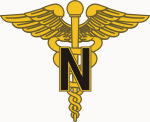Nursing is the third most popular college major, which isn’t a surprise when you consider the profession contains over 2.9 million registered nurses (RNs), who outnumber physicians four to one, and who, on average, earn just under $62,000 annually. That’s a lot of people making a reasonable income in a job that can be personally quite rewarding, though not without its challenges and difficulties.
Most of the nurses you see in a hospital or HMO are registered nurses (RNs); there are also licensed practical nurses (LPN), but they assist RNs and MDs with general care, and have substantially less training. Over half of RNs work in hospitals, but as the health care profession continues to fracture into assorted venues such as public health clinics, you’ll find RNs just about anywhere where health care is administered.
There are three ways to become a RN. One is with an Associate’s Degree, A.D.N. (2 years); another is with a Diploma program—given by hospitals (taking 2-3 years); still another is getting a B.S. in nursing (4-5 years). Regardless of path, all graduates must take a national examination administered by each state, to gain their licenses. To work up the ranks of the nursing profession, however, it is a virtual necessity to attain a bachelor’s degree (B.S.N.). Currently around 40% of RNs hold BSNs.
The demands of a nursing major are substantial. It might not be pre-med, but it’s close. The rigors of the curriculum and the added clinical practice requirements (usually around 16 hours per week) demand superior scheduling and planning. The heavy science and math requirements necessitate a student to study 2-3 hours for every hour of class. Furthermore, while working in these classes and clinics, a typical B.S.N. candidate will also start preparing for the above mentioned NCLEX-RN exam, the national licensing exam taken on a state level.
Nursing is becoming ever more specialized, with many of the nurses’ tasks almost the same as those of front line physicians. Nurses specialize in everything from anesthesia administration to dialysis, and the demands, especially for continuing education, are strong. Many specializations require a master’s degree in nursing or, for major administrative posts, a doctorate (DNP). In short, the training never stops.
Because the demand for RNs with BSNs far outstrips supply, and will for the foreseeable future, accelerated B.S.N. programs abound. Virtually all the top nursing schools in the country offer accelerated degrees. US News and World Report’s top three nursing programs that include University of Washington (Seattle), UCSF, and University of Pennsylvania all have accelerated programs. There are, of course, 100s of accelerated programs. One good source to survey potential prospective nursing programs is Peterson’s Nursing Programs 2011. The first 58 pages of the 623 page compendium are available online free for viewing. Just enter ‘nursing programs 2011’ into Google. If you are serious about nursing as a career, it might be useful to purchase a copy.
The University of Pennsylvania School of Nursing mentions on its website that its “nursing graduates rank among the university’s highest in average starting salaries.” This is good news since the cost of attending is around $60,000 a year. Penn offers the BSN, accelerated, masters, and doctorate programs in nursing. Additionally, it has dual degree programs (one with Wharton, for example, which is rumored to accept around 5 students a year). Not only do students in the program gain the clinical experience, and heavy dose of sciences and math, but all take a range of courses in liberal arts, to ensure they gain the range of knowledge to make them effective humans in the workplace.
With a caring nature, a propensity for the sciences, and a desire to contribute to the well-being and health of a community, you might be a good candidate for becoming a nurse. Should you succeed, you will not have any problem finding opportunities that are well compensated. Assuming you continue to educate yourself in whatever specialty you determine, the compensation and rewards are almost limitless, as is the need.
간호학 전공하기
3번째 인기있는 전공
RN이 되는 길과 간호학 학사
U Penn의 간호대학 알아보기
간호학은 대학에서 3번째 인기있는 전공이며, 의사의 4배나 숫자가 많은 290만명의 RN이 활동하며 연봉은 62,000달러 가까이 된다. 도전과 노력없이는 어렵지만, 꽤 괜찮은 연봉이다.
여러분이 병원에서 만나는 간호사들은 RN이지만, RN과 의사를 돕는 LPN이 있으며, 이들은 훈련기간이 짧다. 반 이상의 RN들은 병원에서 일하지만, 건강과 관련된 공중 보건소 등에서도 만날 수 있다.
RN 이 되는 길은 세가지가 있다. 하나는 준 학사 (A.D.N 2년 과정)이며, 또한 병원에서 2-3년이 일하면서 받는 Diploma 과정이 있고, 4-5년 걸리는 간호학과에서 B.S.를 받는 과정이 있다. 어느 과정이든, 자격증을 따기 위해서는 주 정부에서 실시하는 시험을 통과해야 한다. 물론, 학사학위(B.S.N.)을 갖는 것이 유리하다. 현재 40%의 RN들이 학사학위를 갖고 있다.
간호학 전공의 요구도 의학은 아니지만 거의 비슷하다. 힘든 커리쿨럼에 실습(주당 16시간정도)은 힘든 과정이다. 과학과 수학 또한 1시간강의에 2-3시간은 공부해야 한다. 수업과 실습을 하는 동안, 앞에서 언급한 시험(NCLEX-RN)을 준비해야 한다.
간호학이 전문화되면서 거의 의사와 같은 수준의 일을 한다. 간호사도 마취에서부터 투석까지 공부해야 하며, 특히 평생교육의 강도가 높다. 많은 분야에서 석사학위, 또는 책임분야에서는 박사학위도 필요하다. 결국 평생 훈련이다.
학사학위의 RN에 대한 필요가 급증하므로, BSN 속성 프로그램은 미래가 밝다. 전국적으로 우수한 간호학교들은 속성 프로그램이 있다. US News and World Report 에 따르면, 최우수 간호 프로그램이 있는 Univ. of Washington(Seattle), UCSF, U. Penn은 이 프로그램이 있다. 또한 100개가 넘는 속성 프로그램 학교들이 있다. Peterson’s Nursing Programs 2011을 참고하면, 이 책의 58쪽까지는 온라인으로 무료로 볼 수 있다. 아니면, Google에서 ‘nursing programs 2011’을 찾으면 된다. 정말 간호사가 되고 싶으면 구입을 권한다.
U Penn의 간호대학의 웹싸이트를 보면, “대졸자의 최고의 연봉으로 시작”이라고 언급하고 있다. 등록금이 년간 6만불이 넘으니, 당연히 좋은 소식이다. 이 대학에서는 BSN, 속성, 석사, 박사학위를 제공한다. 또한 2개학위 (Wharton의 프로그램이 1년에 5명을 뽑는다는 소문)를 할 수도 있다. 학생들은 이 프로그램에서 실습, 과학, 수학뿐만 아니라 사회에 나가서 효과적인 인문과학도 공부해야 한다.
자상한 성격인 과학에 건강과 복지에 관심이 있다면, 간호사가 될 자격이 있다. 그리고 성공적으로 공부를 마치면, 무한한 기회가 보상해 줄 것이다. 또한 지속적으로 공부하고 훈련된다면, 돈과 보상은 무한히 따라올 것이다.

